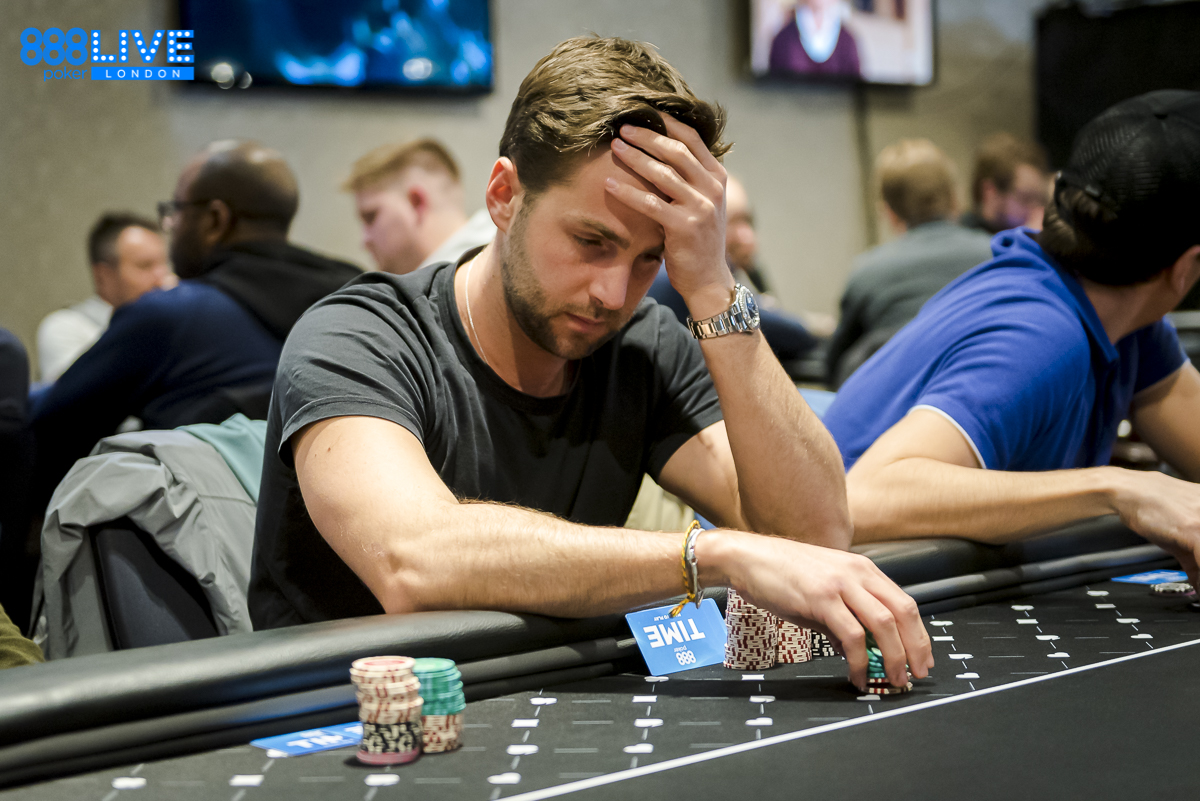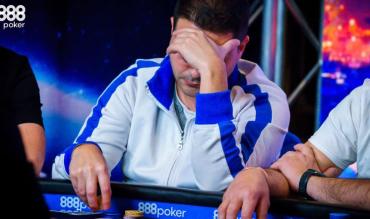Being able to remain calm under pressure is an essential skill to develop, whether talking about the poker table or in everyday life.
Say you're running a stone-cold bluff or facing a tough decision for all your chips. Your ability to make good combination poker choices in the moment hinges on how well you can manage your emotions while remaining calm.
Mastering emotional control is vital when every decision can tip the scales between winning and losing.
In this 888poker article, you'll learn practical, science-backed strategies for maintaining your composure even in high-stress moments. These techniques, drawn from performance and sports psychology, will help you keep a clear head and make good decisions even in tough spots.
So, whether you're trying to make the best decisions in a tough game or looking to improve your stress response, these tips will give you the tools needed to thrive under pressure.
Understanding the Stress Response

Before you can master staying calm under pressure, it’s crucial to understand what happens in your body and mind when stress kicks in. Stress triggers a series of physiological and psychological reactions that can affect your play.
The response to this reaction is to "fight, flight, or freeze".
It's a primal reaction that prepares you to face danger or escape and comprises physiological and psychological responses.
Let's consider the typical physiological reactions in a stressful situation. When stressed, your body releases adrenaline and cortisol. These hormones increase your heart rate, elevate blood sugar, and divert blood to essential muscles.
It’s crucial to note that the physiological stress response does not differentiate between the following –
- A tiger about to attack you (where fleeing would be helpful).
- More mundane stressful events like traffic jams (where fighting or fleeing are not particularly useful options).
Whenever something happens in a poker hand that triggers a stress response, you’re likely to feel jittery and on edge. This scenario might lead to making hasty and potentially costly decisions.
During stressful events, we have to contend with more than just physiological changes. Certain psychological changes often happen, too.
Stress can cloud your thinking.
It often leads to a narrow focus where you might miss essential cues or opportunities because you're hyper-focused on immediate threats or worries.
This tunnel vision can be detrimental in poker because a broad, strategic view of the game is crucial.

These physiological and psychological responses to high-pressure situations are universal. However, it’s crucial to note that each person can experience stress differently. Also, what’s stressful to one person may not be to another, so it's critical to recognise your unique stress signals.
- Do you start to sweat, feel your heart pounding, or find yourself breathing faster?
- You may notice your thoughts racing or a sense of panic setting in.
Identifying these signs early can help you mitigate them before they impact your performance.
By understanding these stress responses and identifying your signs of stress, you can implement strategies to manage them effectively.
This knowledge is necessary not only to improve your poker game but also to enhance your overall decision-making process in any stressful situation.
Techniques for Immediate Stress Reduction
Now that you understand what triggers stress and how it manifests, here are some techniques to quickly reduce stress at the poker table or in other high-pressure situations.
These methods are practical and can be executed even while you’re playing.

1). Breathing Exercises
One simplest and most effective way to control stress and calm down quickly is focused breathing.
Try the 4-7-8 technique:
- Inhale deeply through your nose for 4 seconds.
- Hold your breath for 7 seconds.
- Exhale slowly through your mouth for 8 seconds.
- Repeat several times.
Breathing in this pattern helps slow your heart rate, lower your blood pressure and calm the stress response.
Calming down should help you think more clearly and make better decisions.
2). Progressive Muscle Relaxation
Stress often causes muscles to tense up, making you physically uncomfortable and distracted. Progressive muscle relaxation is one way to alleviate this tension.
To use it, do the following:
- Tensing the muscles in your feet for a few seconds and then release them.
- Gradually work your way up through all your major muscle groups, tensing and relaxing each muscle group until you reach your head.
Practise the 4-7-8 breathing response simultaneously, and you’ll start to relax.
Progressive muscle relaxation not only helps relieve physical stress but also has the added benefit of focusing your attention away from stressors.
3). Use a Mindfulness Minute
Jon Kabat-Zinn, a leading mindfulness teacher, defines mindfulness as “the awareness that arises from paying attention, on purpose, in the present moment, and non-judgmentally.”
Studies show that even one minute of mindfulness can affect how we respond to pressure. It can “un-tilt” us to use a poker term.

For a 1-minute mindfulness exercise, do the following:
- Close your eyes.
- Breathe in deeply for a count of 6.
- Hold for a count of 2.
- Exhale for a count of 8.
- During this time, focus solely on your breath.
- Repeat four times, and you’ll have completed a mindfulness minute.
Doing this can help centre your thoughts and reduce feeling overwhelmed. It’s valuable tactic to regain your composure between hands.
4). Grounding Techniques
If you find yourself getting tilted or otherwise overwhelmed by stress, grounding techniques can bring you back to the present moment.
A straightforward method is the 5-4-3-2-1 technique:
- 5 - Identify five things you can see.
- 4 - Four you can touch.
- 3 - Three you can hear.
- 2 - Two you can smell.
- 1 - One you can taste.
This classic technique diverts your attention from the stressor to the here and now.
Practising these strategies can significantly lessen the impact of stress, allowing you to remain calm and in control, even during the most tilting situations.
Each method is quick and can help you stay focused in any poker board game so you can perform at your best.
The key is to practice them often, so they become second nature. When in doubt, though, you can never go wrong with simple deep breathing.
It’s the fastest way to calm your mind!
How to Stay Calm Under Pressure - Thinking Strategies
Now that you’ve learned several effective strategies for managing the physiological aspects of fight, flight or freeze, here are some strategies to help you keep a clear head.
Understanding and adjusting your thought patterns can significantly improve your ability to stay calm and make rational decisions.

1). Reframing Your Thoughts
Reframing is a common psychological technique that involves changing your perspective on stressful/tilting situations.
Instead of viewing something as a threat, practise seeing it as a challenge or an opportunity to learn and grow. This shift in thinking often reduces fear and anxiety, allowing you to focus on your playing strategy rather than on the stress of the situation.
2). Staying Present
It’s crucial to learn to stay present. Focus on the current hand or decision without getting distracted by past losses or potential future outcomes.
When you stay present, you avoid the common pitfall of letting past emotional upsets lead to poor decisions. Practising mindfulness can help you stay present by teaching you to observe thoughts and feelings without judgment while keeping your mind in the now.
3). Setting Process Goals
Set process goals for each game instead of focusing solely on winning (also known as an outcome goal - like winning a WPT Poker tournament). A process goal is an objective focused on the actions you need to take to achieve a desired outcome.
Process goals are the specific behaviours and steps you take (such as practising a skill daily or following a study plan). Process goals help you concentrate on improving and maintaining the consistent efforts necessary to reach your long-term goals.
Using process goals will control your responses more effectively while reducing feelings of pressure related to the results.
As long as you achieve your process goals, you can consider yourself a success!
Incorporating thinking strategies into your game will help you control your emotional responses better when the going gets tough.
These techniques not only help while playing poker but can also be beneficial whenever you find yourself in a stressful situation.
Conclusion – How to Stay Calm Under Pressure
Mastering the art of staying calm under pressure is a fundamental skill for any poker player who wants to succeed. This 888poker article has explored various techniques—from quick stress-reduction strategies to more advanced cognitive behavioural tools.
These methods will help you manage immediate stressors and build a foundation of mental resilience that will serve you well in poker and life.
Experiment with these strategies to find what works best for you!


